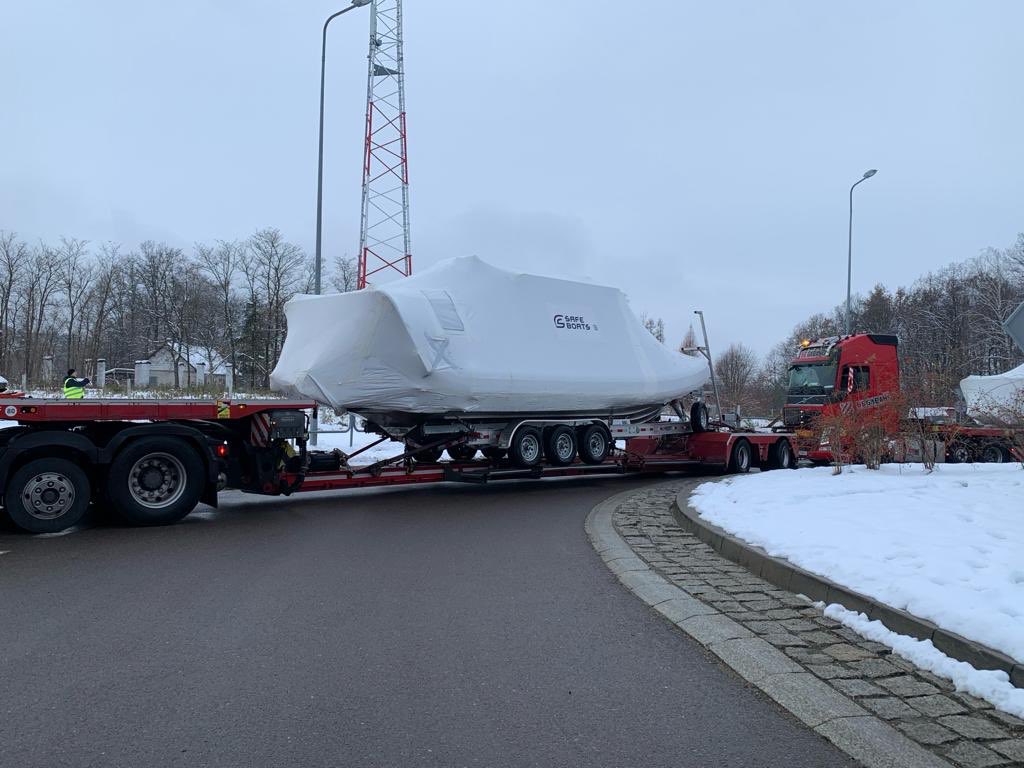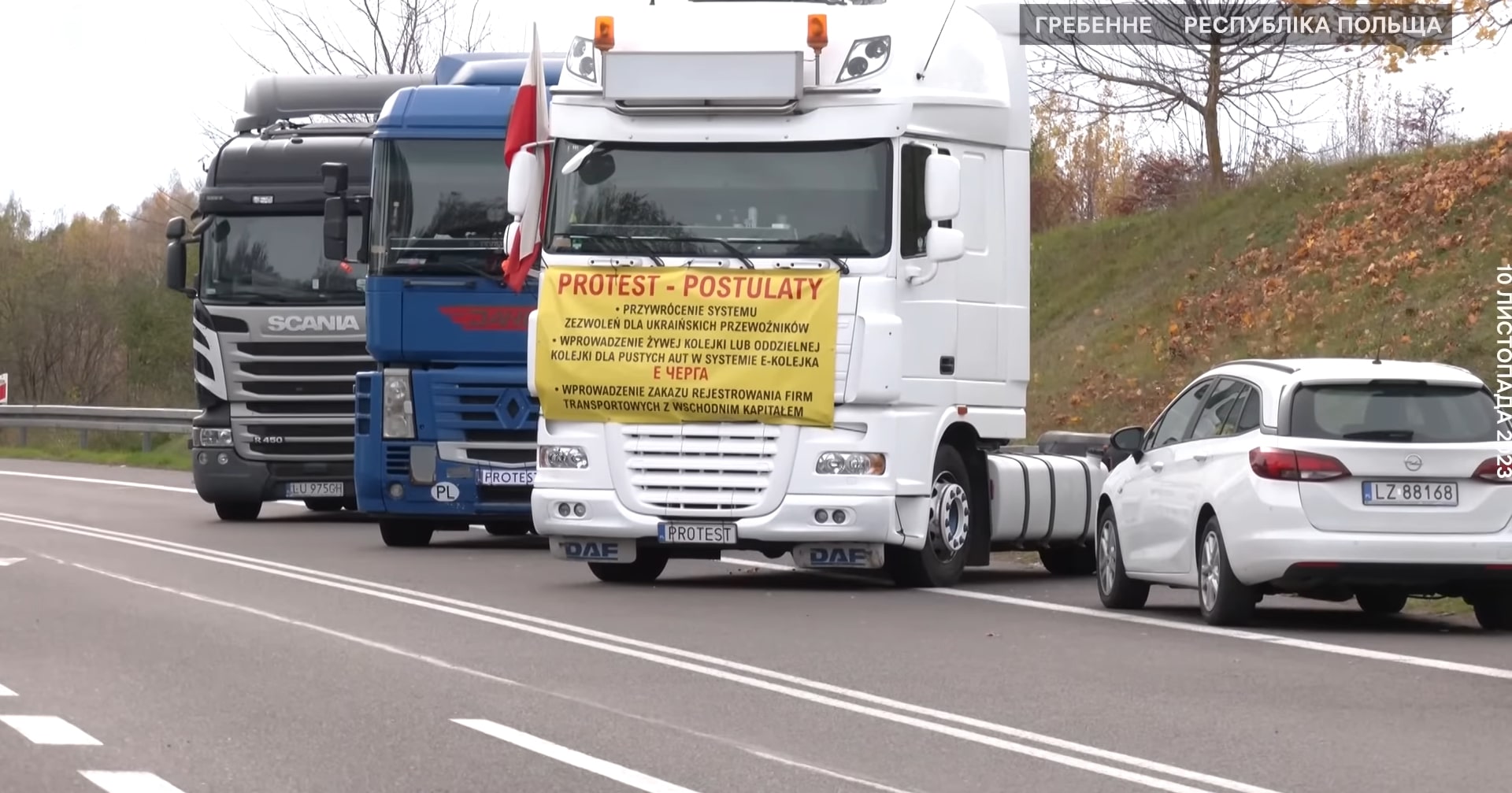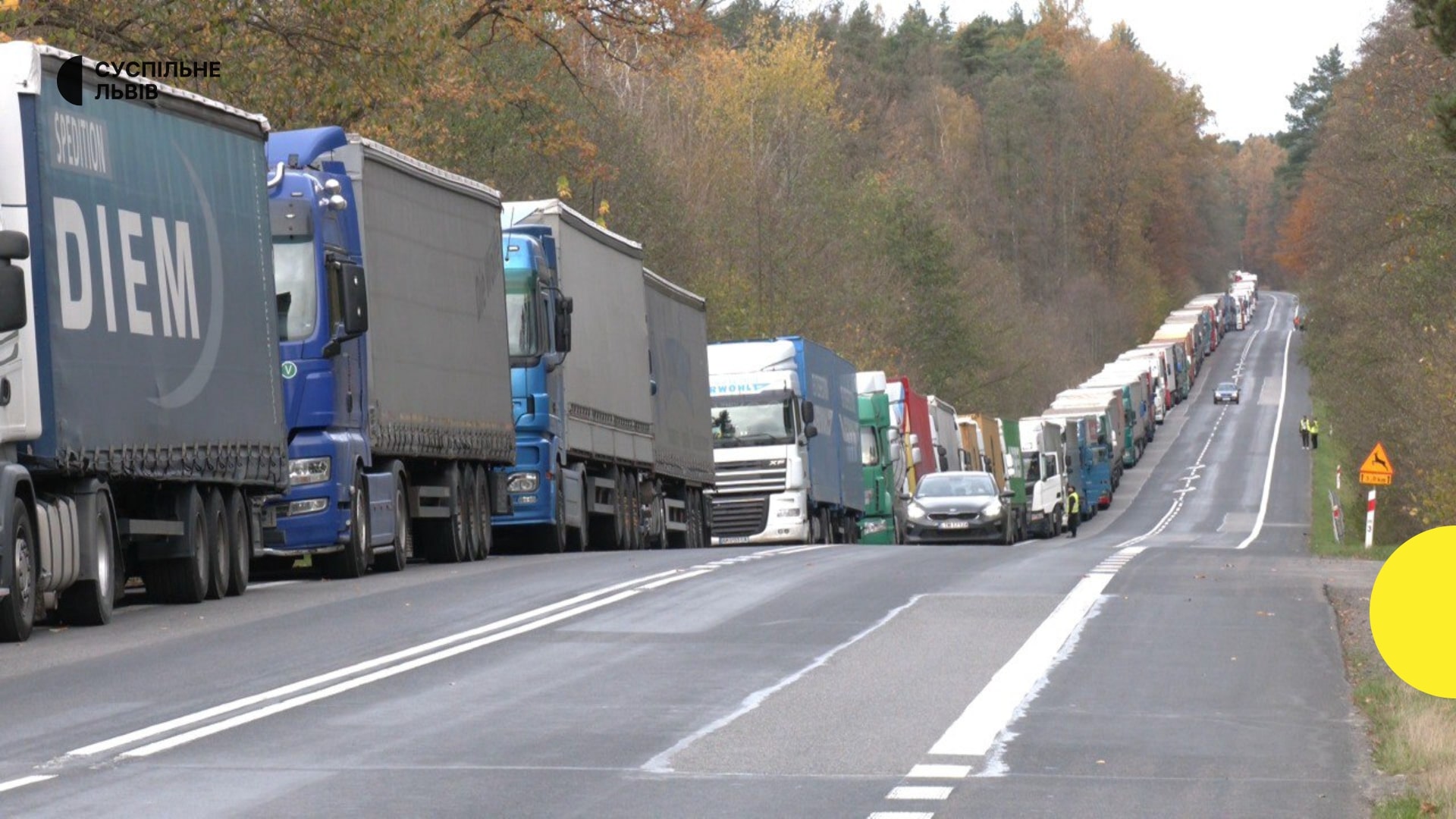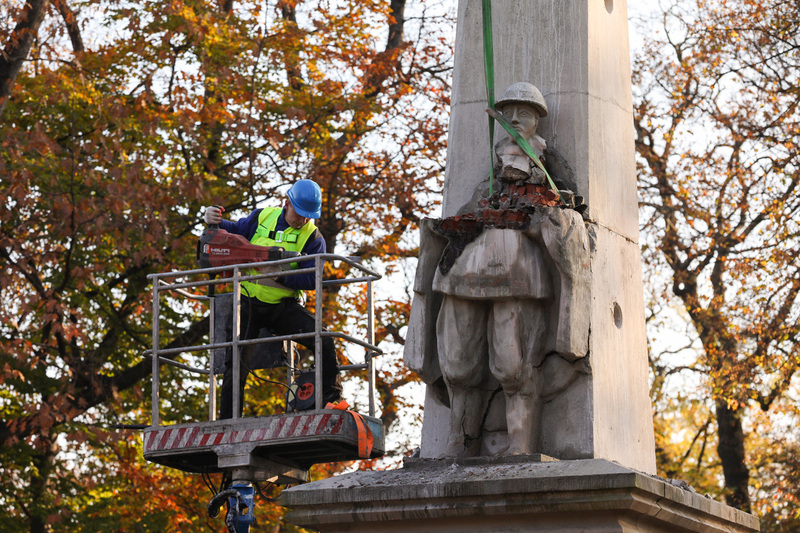The Polish protesters claim they allow military cargoes to pass, but this is far from reality.
As was reported by Pawlo Krawchuk from NGO Europe Without Barriers, Polish protesters didn't allow the truck with a boat for Ukraine to pass. They forced it to go to the end of the queue and wait there, which would take several weeks if the blockade lasted.
Polish protesters claimed it was allegedly an "expensive yacht," while the photo shows the logo of SafeBoats company, which produces mainly service boats.

Krawchuk wrote to the company for a comment, and it confirmed it provided these boats for Ukraine's military:
"SAFE Boats International provided ... 27-foot Walk Around Cabin patrol boats for Ukraine as part of a US Government aid program. The vessels provided by SAFE Boats are intended for use as government patrol vessels and not intended for use as private yachts."
That means that the Polish protesters are not only wreaking havoc on Ukraine's economy and delaying vital supplies indirectly but are also directly blocking military shipments.
The story told by Ukrainian serviceman Robert Brovdi, callsign Madiar, was even more stunning.
The founder of Madiar's Birds unit and volunteer organization, he organized fundraising for 500 military boats to support the Ukrainian offensive across the Dnipro river in Kherson oblast.
Money for 180 boats has already been collected, and the boats have been ordered. However, due to the Polish blockade, it took more than two weeks to deliver a batch of the boats from the Netherlands to Ukraine. Under normal conditions, this route would take up to three days.
Four more cars with boats are still waiting in line to cross the border, Madiar said. In the video, he showed documents confirming that boats stayed on the Polish border for two weeks. Protesters didn't allow this cargo to pass ahead of the queue.
Due to the border blockade by the Polish & Slovakian protesters & the Hungarian ban, it now takes 2 weeks to deliver military cargo from the EU to Ukraine
Ukrainian servicemen and volunteer Madiar, who is currently delivering boats, explained the situation⬇️ More:… pic.twitter.com/cZ6DQcPIn3
— Euromaidan Press (@EuromaidanPress) December 4, 2023
The entire western Ukrainian border is now blocked
Not only is Poland’s border to Ukraine de-facto closed for cargo, but Hungary does not allow any vehicles with military cargo for Ukraine to pass through its territory at all, let alone crossing the border to Ukraine. This is not a new Hungarian policy, but under current circumstances, it further deteriorates the situation with military cargo shipments for Ukraine.
Slovakian carriers also started their blockade of the Ukraine border on 1 December 2023. The Union of Truck Carriers of Slovakia (UNAS) is blocking trucks in the Slovak village of Vyshnie Nimetske, which is not far from the Ukrainian city of Uzhhorod. As of 4 December 2023, the queue of over 700 trucks from Slovakia to Ukraine has reached almost 30 kilometers.
This has already caused additional traffic and long queues of trucks to Ukraine on the Hungarian-Ukrainian border, albeit only cars with civilian goods can pass there.
The only remaining fully open border to Ukraine is Romanian. The car queues have already grown there, although Romania is an additional detour compared to the main transit directions from the EU to Ukraine. Before the Russian full-scale invasion, Romania was not Ukraine's main transit partner, unlike Poland, Slovakia, or Hungary.
Protesters' demands
The protesters’ main demand is to abolish the “transport visa-free” system under which Ukrainian carriers enter the EU without special licenses since 2022. The protest was also joined by Polish farmers, who protested in the spring of 2023 against the transportation of Ukrainian grain and corn through Poland. This grain export ban was still not entirely lifted after reaching a compromise.
Polish truckers who protest say the “competition is unfair” because Ukrainians can offer a significantly lower price per kilometer than their Polish colleagues due to allegedly “lower taxes.”
The protesters demand the return of license permits for Ukrainian carriers. However, this demand is impossible to implement unless the EU Commission decides to do so and reverses its previous decision regarding the license-free transition of goods for Ukrainian companies.
This step would contradict Ukraine’s EU integration, including the expected beginning of the EU accession talks in 2024.

Ukrainians call demands of Polish blockade a “manipulation”
Levko Prokipchuk, an expert on the application of customs legislation at the Association of Professional Customs Brokers of Ukraine, said that most Polish arguments do not correspond to reality.
The argument about allegedly unfair competition is totally absurd.
“Polish strikers claim that their companies are going bankrupt because Ukrainians bear lower expenses and taxes. It remains unclear why the Polish owners did not create firms here in Ukraine and did not reduce their expenses,” Prokipchuk said.
He noted further that contrary to claims about the alleged bankruptcy of Polish companies, their market of trucker transportation grew after the Russian invasion due to increased trade and supplies to Ukraine. In particular, during the 22 months of the war, 3,381 Polish carriers were created and started operating, 25% more than in the same period until 24 February 2022.
According to the estimates of the Federation of Employers of Ukraine, the economy of Ukraine has already lost at least €400 million. Polish entrepreneurs also suffer from the blockade since Polish exports can't be moved to Ukraine properly.
What is true is that for Polish carriers, the rapid movement of empty trucks across the border beyond the Ukrainian queue is critically important. The cost of their freight covers the road in both directions, while Ukrainians are mainly looking for orders in both directions simultaneously because this is one of the simplest and most effective ways to reduce their costs and obtain additional profit.
Ukrainian government makes one step towards a compromise
The Ukrainian government decided to meet this reasonable demand of Polish protests and allow rapid movement of empty trucks beyond the general queue. In particular, according to the results of the agreements of the Ministry of Development of Communities, Territories, and Infrastructure of Ukraine with the Ministry of Infrastructure of Poland, the checkpoint "Uhryniv-Dołhobyczow" was opened for empty trucks from Ukraine to Poland starting from 4 December 2023.
This means that Polish truckers can return from Ukraine to Poland through this checkpoint without registering in the Ukrainian general online queue, which would save them time.
"The opening of Uhryniv is the first point on the list of measures we are implementing to unblock the border, reduce queues and increase the capacity of the Ukrainian-Polish border. We are working to lift the blockade as soon as possible, taking into account the interests of our market and the state," The Minister of Development of Communities, Territories and Infrastructure of Ukraine Oleksandr Kubrakov emphasized.
Meanwhile, the blockade continued as of 4 December 2023.
During the EU Transport, Telecommunications, and Energy Council on 4 December 2023, the Polish, Slovak, and Hungarian delegations informed the Council about the impact on the transport sector of the EU-Ukraine agreement on the carriage of freight by road, according to the press release.
Russian trace in the Polish blockade
The organizers of the Polish trucker blockade at the Ukrainian border have close business and political ties to Russia. Their companies used to trade with Russia actively before the full-scale invasion. Some are also members and leaders of the Confederation party — the only pro-Russian Polish political party that opposes military aid to Ukraine.
The official protest organizer at the Ukrainian-Polish border crossings is Rafał Mekler, the owner of the transportation company Rafał Mekler Transport. He is also the head of the Confederation in Lublin. The party is known as the most pro-Russian in Poland. In particular, the leader of the party, Janusz Korwin-Mikke, has called for the recognition of the Russian occupation of Crimea.
Another key political supporter of the Polish blockage is Grzegorz Braun, the leader of The Crown party (Confederation of the Polish Crown), the monarchist party in Poland, which is also anti-Ukrainian. On 16 November, at the Polish checkpoint Korczowa, Braun met with the strike organizers and the co-founder of the aforementioned Confederation party. At the beginning of the all-out Russian invasion, Braun was the only member of the Polish Parliament who voted against the resolution condemning Russian war crimes. Brown is known as the author of the slogan “Let’s stop the Ukrainization of Poland.”
Belarusian citizen and owner of the PEO-Trans company, Viktor Gordeyuk, is also behind the strike. He is studying at one of the higher military educational institutions in Belarus while his brother is serving in the 38th separate airborne assault brigade of the Belarusian army. The PEO-Trans company was participating in other pro-Russian actions organized by Rafał Mekler Transport, demanding the lifting of anti-Russian sanctions.
UNAS, the organizer of the border blockade in Slovakia, was also supported by the anti-EU radical party Our Slovakia. The party advocated for “restoring friendly ties” with Russia while its leader, Marian Kotleba, wrote a letter to former Ukrainian President Viktor Yanukovych in 2014 comparing the Euromaidan Revolution to terrorism.
Read also:
- Ukroboronprom refutes claim of exporting spare parts to Russia
- The Economist: Russia’s EW superiority emerges as Ukraine’s key weakness on frontline
- SBU unveils new details of marine drone attack on Crimean Bridge
- DeepState: Russians have built over 6,000 km of fortifications in occupied territories
- Ukraine and Poland prepare measures to unblock trucker blockade
- Second Ukrainian trucker dies in Poland amid border blockade





